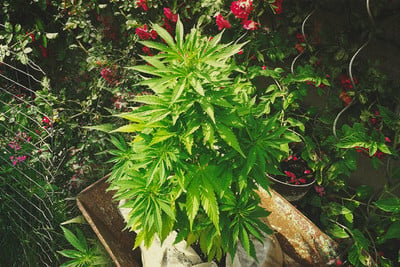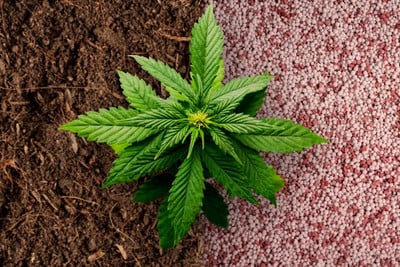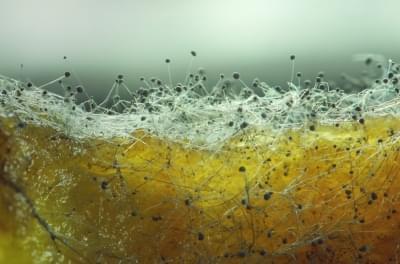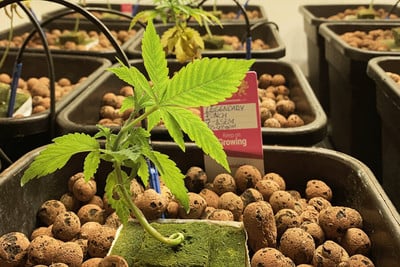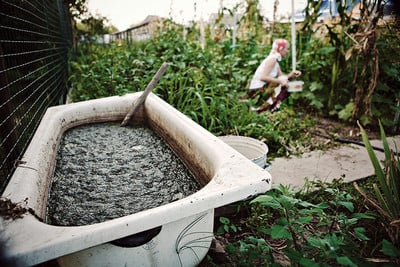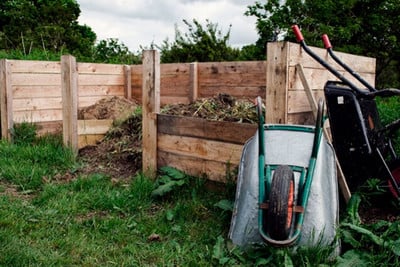.

Worm Castings Cannabis Fertiliser: What Is It and How Does It Work?
Heard about the benefits of worm castings in the garden? Keep reading to learn how to use this natural fertiliser to support the growth and health of your cannabis plants.
Worm castings are a powerful organic fertiliser rich in nitrogen and many other nutrients. Commonly used by all manner of gardeners and farmers, learn more about the benefits of worm castings for cannabis plants below, and how to apply them in multiple ways in your grow-op.
Contents:
What Are Worm Castings?
Worm castings, also known as vermicast, are essentially the waste produced by red Californian worms (Eisenia fetida). Worms feed off of and decompose pretty much all organic matter, meaning that anything that once lived eventually becomes worm food—from fruits and vegetables to humans. As they feed, worms produce manure (i.e. worm castings), which, thanks to their unique digestive systems, are rich in nutrients and beneficial microbes that benefit the growth of plants and help to establish a healthy soil ecosystem.
What Is Vermiculture and Vermicompost?
The term "vermiculture" refers to the process of breeding and producing worms to decompose waste. If you've got a worm bin at home, you're actively practising vermiculture already. If you don't, getting started is as simple as getting your hands on some Californian red worms, giving them a home in a bin or similar structure and feeding them (which is as simple as reserving the scraps from your kitchen every time you cook).
The term vermicompost, on the other hand, refers to the final product produced by composting worms (i.e. worm castings). Worm castings are dark brown or black in color and have a texture similar to coffee grounds. They smell like fresh, fertile earth and can be used to top-dress potted plants or mixed directly into your soil/potting mix before planting.


Why Are Worm Castings Good for Cannabis Plants?
Farmers and gardeners have long been using worm castings to fuel the growth of their plants. And cannabis growers can do the same. Worm castings are a great fertiliser with many benefits for cannabis plants, including the following.
1. Worm Castings Are Rich in Nutrients
Worm castings, like other forms of manure, are naturally rich in nutrients and organic matter that your weed plants can absorb to fuel their growth. The most prominent nutrient is nitrogen (in the form of highly concentrated nitrates), but worm castings also contain a rich array of other nutrients, including:
|
|
Unlike regular chemical fertilisers, however, the nutrients in worm castings aren't readily available to plants, which greatly minimises the risk of overfeeding. The nutrients in worm castings first need to be broken down by soil organisms, and thereby offer a much slower release of nutrients to your plants, allowing for gradual, more controlled feeding.
2. Worm Castings Help to Improve Soil Quality/Health
Besides providing a variety of nutrients for your cannabis plants, worm castings also improve the quality of your soil considerably. And as we've said in many of our other articles on cannabis growing, healthy soil is the key to healthy marijuana plants. Some of the ways worm castings improve soil include:
- Improving soil aeration: Well-aerated soils make it easy for roots to respire and grow, helping cannabis plants produce large, strong root systems.
- Increasing water retention: Soils with higher moisture retention need to be watered less frequently and help to anchor nutrients that would otherwise leech out of the soil during watering.
- Boosting microbial soil life: Worm castings contain nutrients that feed beneficial bacteria, fungi, and other microorganisms that produce and store plant nutrients as well as minimise pests/pathogens (see below).
3. Worm Castings Improve Plant Health
Through their rich concentration of nutrients, worm castings directly stimulate both the vegetative growth of cannabis plants and their ability to produce healthy, resinous flowers. However, studies show that worm castings also benefit plants by:
- Improving seed germination rates[1].
- Curbing pathogens[2], particularly those that cause root diseases such as root rot and damping off.
- Repelling pests such as mites, aphids, and mealy bugs—partially because worm castings naturally weaken the protective shells of some of these insects.

Will Worm Castings Burn Cannabis Plants?
As mentioned earlier, the nutrients in worm castings aren't readily available to your plants like those found in liquid chemical fertilisers. Instead, they are released into the soil gradually and in a controlled manner. Plus, many of the organisms present in your soil ecosystem will also feed off the nutrients in worm castings. Therefore, worm castings are very unlikely to cause nutrient burn in cannabis plants.
How to Make Worm Castings for Cannabis
Making worm castings is a pretty straightforward process and only requires three ingredients:
🗑️ A vermicompost/compost bin
🐛 Red Californian earthworms
🍐 Organic matter to feed the worms
Buying/Making a Vermicompost Bin
Vermicomposting has gained a lot of attention lately, meaning vermiculture products such as worm farms are becoming ever more accessible. Even in large cities, growers have, in some way or another, incorporated vermicomposting into their lifestyle.
If you want to start making your own vermicompost for your cannabis garden, either store for a worm bin to suit your needs or consider building one.


Sourcing Californian Compost Worms
Not all worms are equally effective for composting. By far the most commonly used worms for vermiculture are Eisenia fetida, which you can buy from garden centers or grow stores. A single node/pack of worms is usually all you'll need to get your vermicompost started. In spring and summer, the worms will reproduce very actively and, as long as you keep an eye on the mix of ingredients you're putting in your bin, you'll soon have more worms than you'll likely need.
Feeding Your Worms and Keeping a Healthy Compost Heap/Bin
Arguably the biggest challenge of making your own worm castings is maintaining a healthy compost bin. Essentially, this involves putting the right amount of the right ingredients into your compost. Without getting too detailed, this basically boils down to striking the right balance between:
- Green ingredients: Such as fruit/vegetable scraps, plant/grass cuttings, used tea leaves and coffee grounds, and egg shells.
- Brown ingredients: Scrunched-up pieces of paper and cardboard, egg cartons, and dried leaves/dead plant matter.

Which Worm Castings Are the Best for Cannabis?
Some of the main concerns about the quality of worm castings are:
- The ingredients that the worms were fed: Putting diseased plant matter into your compost bin, for example, may result in pathogens living in your worm bin and possibly affecting any plants that you later fertilise with the finished worm castings.
- The age of your worm castings: Worms take roughly 2–3 months to decompose organic matter and produce castings. Using worm castings that haven't been completely decomposed may also introduce decomposing scraps into your garden and attract pests/pathogens.
- Storage: Many gardeners like to mature their worm castings for 6 months or longer, claiming that castings get better with time. When storing worm castings, it's important that they do not dry out, become overly humid, or exposed to direct sunlight. All of these factors can kill some of the living organisms in the castings.
Ideally, the best worm castings for weed are those that you make yourself using a compost bin or heap. However, not every cannabis grower has the time or space to dedicate to composting (which is understandable). In that case, we recommend buying high-quality worm castings from a garden store/center. Where possible, be sure that the worm castings are relatively fresh or have been stored appropriately.

How to Use Worm Castings in Your Cannabis Grow
Using worm castings in your cannabis garden is a simple way to fertilise your plants, promote soil health, and strengthen the root zone. In what follows, we’ll teach you how to use worm castings to support the health and growth of your cannabis garden.
Using Worm Castings in Soil
One of the best ways to use worm castings in your cannabis grow is as a soil amendment:
- Prepare a large, clean tub, wheelbarrow, or other container to mix your soil.
- If you're not using any other natural fertilisers as a soil amendment, you can use up to 1 litre of worm castings for every 2 litres of soil.
- If you're using other natural fertilisers to amend your soil, use 0.5 litres of worm castings for every 2 litres of soil to avoid ending up with a soil that's too nutrient dense (or "hot").

Using Worm Castings to Top-Dress Soil
Another great way to use worm castings in your cannabis grow is to apply it directly to the topsoil. Apply roughly 0.5–1 cup (8–16 tablespoons) of worm castings in a circle around the base of your weed plants.
Worm Castings Compost Tea
Last but not least, you can also fertilise your cannabis plants by using worm castings to make a nutrient-rich "tea."
- Add your worm castings into a porous bag and close.
- Fill a 20l bucket with unchlorinated water.
- Place the porous bag of worm castings into the bucket of water and soak overnight.
- Remove the bag of worm castings. Your worm casting tea is now ready, and can be used as a foliar spray or a liquid fertiliser.


Worm Castings: A Versatile, Natural Cannabis Fertiliser
Worm castings have long been a favorite among gardeners and farmers. To cannabis growers, they offer all the same benefits and make for a natural, versatile fertiliser that not only feeds your plants, but also improves soil health and structure.


























